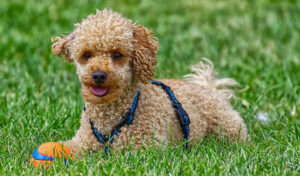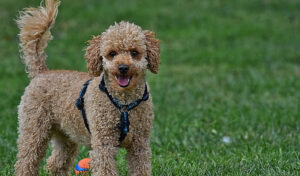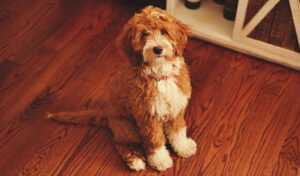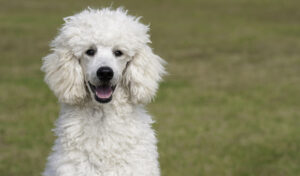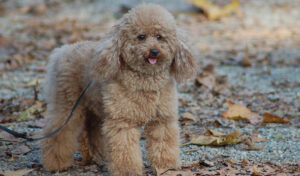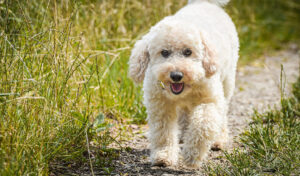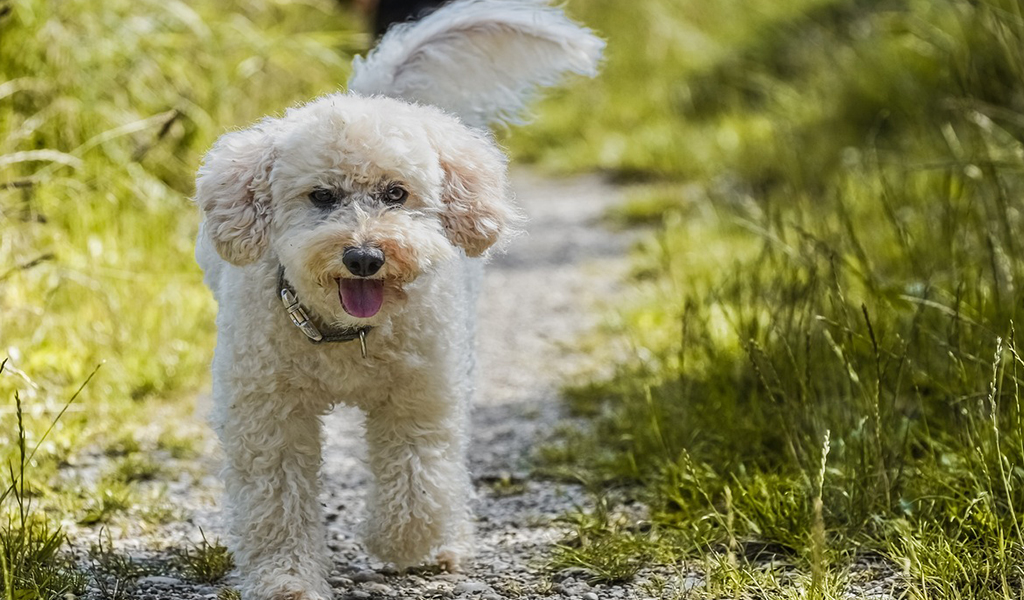What is a Poodle Dog Breed?
The Poodle is a breed of water dog also known as the Poodle in German and the Caniche in French. Standard Poodle, Medium Poodle, Miniature Poodle, and Toy Poodle are the four size-based variants of the breed, albeit the Medium Poodle type is not widely recognized.
The Poodle is an amazing dog, as seen by the numerous best-in-show winners from this breed. It is elegant, proud, and clever. The friendly family dog with a long history and a variety of skills may be found hiding behind the blue ribbons, stunning hairstyles, and regal demeanor.
They come in a wide range of colors, but only solid ones are accepted by breed registries. They have an unique thick, curly coat.
Content Overview
- History
- Different names
- Appearance and Characteristics
- Personality and Temperament
- Health & problems
- How to take care
- Puppy Information
- Puppy price
- Things to consider adopting a puppy
- Advantages & Disadvantages
- Photo gallery
Poodle Dog History
The majority of cynologists think that a dog like the Standard Poodle of today was the ancestor of the Poodle in Germany during the Middle Ages. The water dog of Germany was the poodle. The Germanic name for the breed, the Poodle, or “Pudel” in German, which is derived from the Low German term puddeln, is one of the arguments given to support this notion.
As early as the 17th century, several paintings by different German artists include dogs that are clearly of the Poodle breed. The American Kennel Club (AKC) and the Kennel Club of the United Kingdom both recognized the Poodle shortly after their respective clubs’ foundation in 1886 and 1874, respectively.
Regardless of the poodle’s country of origin, their German and French breed names imply that their forebears were used by waterfowlers to collect shot game as well as lost arrows and bolts that missed their target.
Different names or Types
Poodle Dog other names
- Pudel
- Caniche
Recognized Names
Recognitions
- AKC: American Kennel Club
- UKC: United Kennel Club
- FCI: Fédération Cynologique Internationale
Appearance & Characteristics
The main difference between the several types of the lively, athletic breed known as the poodle is their size. Poodles have rough hair and thick, curly coats. The Poodle coat requires a lot of maintenance to remain attractive and healthy.
Poodles are frequently mentioned as a hypoallergenic breed of dog. They have teary eyes that might discolor the nearby hair. Poodles all have a square silhouette, a long, graceful neck, and a straight back. Docked, the tail is not short and may wave cheerfully.
They frequently resemble leggers, with a large nose and drooping ears. They walk with a bouncy, animated pace.
Breed basic characteristics
- Country of origin: Germany & France
- Breed group: Companion Dogs
- Life span: 12-15 years
- Size: Medium To Large
- Height: 18-24 inch
- Weight: 50-70pound
- Coat: Short, Long, Medium
- Type: Purebred
- Shedding: infrequent
- Colors: White, Silver, Black, Sable, Gray, Apricot, Red, Brown, Blue, Cream, Black & White.
- Also as known: Caniche, poodles
- Good with children: Yes
- Personality traits: Active, fun-loving, alert, intelligent, loyal
- Good with pets: Yes
- Barking: Frequent
- Competitive registration: AKC, UKC, FCI
- Eyes: Their eyes are small like almonds and very dark.
- Ears: Their ears are long, broad and floppy.
- Body: Medium body
Coat
While poodles are distinguished by their distinctive cotton candy coat. Its coat consists of a woolly undercoat and a thick, wiry topcoat. The coat can be any color, including gray, white, black, brown, apricot, and cream, as long as it is solid and not variegated.
Color and Markings
Common coat colors for this Breed include.
- Apricot
- Black
- Brown
- Blue
- Cream
Coat Color and Markings
Poodles come in a variety of solid base colors. They can be apricot, cream, blue, brown, silver beige, black or silver.
Personality and Temperament
Personality of Poodle Dog
Poodles are famous for being intelligent and easy to train. They are good-humored dogs that are energetic, active and fun-loving. They seek attention and if ignored or left alone, they may pick up unwanted behaviors such as unwanted barking.
Small poodles have a tendency to bite other dogs or people who are not their family members. Early exposure to other people and animals, as well as a strong hand in training, are both recommended.
They tend to fiercely protect their home and family. It should be kept in mind that poodles are essentially dressage hunting dogs, so they need training and activity to excel as companion dogs.
Temperament of Poodle Dog
Poodles Depend on praise, physical attention, and positive reinforcement. They are highly perceptive and often pick up on their owners’ moods. Additionally, they are amicable, devoted, nice with kids, submissive, and welcoming of other animals.
Poodles may occasionally be difficult to comprehend. Poodles are fun and active in addition to having characteristics that make them excellent companions. They unquestionably blend into households well and get along with both adults and kids.
Poodles, like other dog breeds, are linked with several undesirable traits. Poodles have a lot of energy. They demand a lot of mental practice and modelling. Through hyperactivity, destructive chewing, and barking, they will vent their frustration.
Poodles are reserved around new people. If they are not provided adequate companionship, they may be destructive.
Also Read: Basenji Dog Breed
Activity Requirements
The muscular and energetic breed known as the standard poodle benefits from 60 to 90 minutes of daily exercise. Their exercise should ideally be broken up into two periods, one in the morning and one in the evening.
Compared to an adult, poodle pups require less activity. For a puppy, 5 minutes of activity each day, per month of age, is the safest amount. Exercise is essential for a dog’s general health and can possibly lengthen their life.
Giving a Poodle the correct exercise is much more than just sometimes taking her for a walk. The appropriate ratios of these components must be provided, but too much exercise is also problematic. Exercise explains how to choose the ideal amount of activity for a Poodle of any kind and at any age.
Trainability
Poodles are very trainable. They pick up the pattern quickly and don’t need more motivation or reward than a treat. Compared to many other dog breeds, house training is generally a breeze for poodles.
Poodles are known for their intelligence and naturally excel in agility competitions. They love to learn and want to please their owners. You can teach pup to pick up the newspaper and fetc slippers. They appreciate any opportunity to learn.
They can become agitated and restless without regular training and care. Destructive behaviors associated with this anxiety disorder are often seen, such as soiling carpets or scratching furniture.
Health & problems
Poodles are susceptible to a variety of dogs health issues, just like any other breed of dog. It’s critical for Poodle owners to understand typical health issues and difficulties as well as how to provide their pet the care they need and prevent illness.
Hip dysplasia, progressive retinal atrophy, epilepsy, Addison’s disease, thyroid problems, hypoglycemia, bloat, and collapsed trachea are among the typical health conditions that affect all Poodles.
Hip dysplasia: The disorder, which is assumed to be inherited, typically manifests as a dislocated hip joint as a result of improper hip bone development.
Progressive Retinal Atrophy: This is a serious eye condition. Blindness may result from this eye condition, which invariably damages the retina in both eyes at the same time.
Feeding Plan
When selecting a dog food for poodles, you should take into account their age, weight, and amount of daily exercise. Between breeds and life stages, dogs’ dietary needs, food preferences and personalities vary. A high-quality protein diet for poodles should include foods like chicken, beef, turkey, hog, duck, or fish.
Nutrients can also be found in grains, fruits, and vegetables such rice, pumpkin, apples, peas, and carrots. In contrast to a sedentary adult poodle of the same weight, an active standard poodle needs 1740 calories per day.
Poodles who are active could need 20% to 40% more food. You may give a poodle a variety of diets, including dry food, wet food, dry and wet mix, homemade food, raw food, dehydrated food, and freeze-dried food.
Living conditions
There are three distinct sizes of poodles. Poodles are excellent for allergy patients since they all have a characteristic thick, curly coat that sheds seldom.
They are wonderful family dogs because they are playful, intelligent, and simple to train. Poodles function best while getting lots of mental and physical exercise, and they want to be among other people.
They get along well with kids and are wonderful pets. They can adapt to any environment and will do well in either an apartment or a large house with a backyard.
How to take care of Poodle Dog?
Poodles are lively, bright and generally friendly dogs. Poodles are notable for leaving little hair in their wake, making them the perfect companion for individuals with moderate allergies.
They should be fed properly and on a schedule so that they don’t get affected. Grooming them is very important.
Grooming & Brushing
Regular brushing and grooming also promotes circulation and helps distribute the natural oils found on the skin. This will benefit the skin a lot in the long run. Regular brushing will also keep the poodle looking great.
To maintain the dog’s appearance, you may need to use different types of brushes. This is because poodles can have different types of coats and they all have different needs. The most common brush that is recommended for brushing a poodle is a slicker brush.
As soon as the poodle gets dirty, insist on washing it and insist on monthly nail trimming. It is necessary to brush their teeth once a week. Continue to check and care for their ears.
Feed Healthy food
The greatest diet must be offered to poodles if they are to live a long and healthy life.
They require fat, protein, fiber, vitamins, and minerals in their diet.
Poodles need at least 18% protein as adults and 22% protein when they are growing. 5% of adults require fat. In addition to them, living depends on water, carbohydrates, vitamins, and minerals.
The second-most crucial nutrient for a poodle’s diet is fat. Protein is converted into fat, which is used as a fuel source. Minerals like calcium and phosphorus, which are necessary for healthy bones and teeth, are also necessary for a dog’s health.
The following items should never be feed to Poodle Dog
- Chocolate, coffee, or tea
- Grapes or raisins
- Moldy or spoiled food of any kind
- Yeast dough
- Poultry bones
- Alcohol, beer, wine or liquor
- Salt & salty foods
- Onions, chives, and garlic
- Tomato leaves stem or unripe fruit
Puppy information
Poodle Dog Training
Poodle puppies are adorable, active and ready to please. Although intelligent dogs like poodles will be easy to train, due to their high level of intelligence, training can be difficult. Teach the puppy to sit, stay and call you by name and also to sleep.
When potty training a poodle, use positive reinforcement. It is important to instruct them in manners, sociability and obedience.
Behavioral training
Training their behavior is crucial for poodle puppies, just as for other dogs. For caring for the dog, this instruction is quite beneficial. If you wish to quickly teach a puppy’s behavior, start by identifying some of the most frequent issues, such as breaking, aggressiveness, food security, crying, mouthing and chewing, separation anxiety, etc.
Obedience training
By following straightforward obedience orders, a poodle can keep track of items, prevent some behavioral issues, and assist with grooming. Obedience training is always beneficial since it helps poodle dogs exhibit and social abilities, may excel in dog sports like rallying and obedience.
Socialization
A young poodle’s socialization is crucial. In terms of growth, a puppy’s first few weeks of life are absolutely crucial. A developing dog requires patience and consistency from its owner. You may support the growth of a puppy’s socializing abilities as well as its behavioral and personality qualities.
The points of socialization include taking the puppy to other houses, giving it different toys, exposing it to various sounds, and presenting it with various difficulties.
Poodle Dog puppies for sale
Poodles are very smart and easy to train. They love and succeed in a range of dog activities including agility, obedience and tracking. They are elegant, nimble and intelligent.
A typical price for a purebred poodle ranges from $600-$2000. Small poodles are generally priced in the high range.
Things to consider adopting a Poodle Dog
- The poodle is a low-shedding dog that does not produce pet dander or hair. They have a waterproof coat of tightly curled hair.
- When their requirements are addressed, they are often content with short strolls or extended travels.
- They are generally calm indoors but need space to run and play every day.
- Toy poodles are extremely sociable Dogs. They like being around their humans and will choose a member of the family to have a special relationship with.
- The body language and emotions of toy poodles are quite perceptible to them. On occasion, they comply with the commands.
Advantages and Disadvantages
Advantages of Poodle Dog
- They are easy to train
- They are very intelligent
- They are excellent family-friendly.
Disadvantages of Poodle Dog
- They need a lot of mental exercise.
- They require a lot of grooming
- They are sensitive to tense circumstances.
Poodle Dog Photo Gallery
